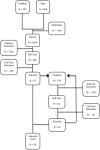Herpes Zoster Risk Reduction through Exposure to Chickenpox Patients: A Systematic Multidisciplinary Review
- PMID: 23805224
- PMCID: PMC3689818
- DOI: 10.1371/journal.pone.0066485
Herpes Zoster Risk Reduction through Exposure to Chickenpox Patients: A Systematic Multidisciplinary Review
Abstract
Varicella-zoster virus (VZV) causes chickenpox and may subsequently reactivate to cause herpes zoster later in life. The exogenous boosting hypothesis states that re-exposure to circulating VZV can inhibit VZV reactivation and consequently also herpes zoster in VZV-immune individuals. Using this hypothesis, mathematical models predicted widespread chickenpox vaccination to increase herpes zoster incidence over more than 30 years. Some countries have postponed universal chickenpox vaccination, at least partially based on this prediction. After a systematic search and selection procedure, we analyzed different types of exogenous boosting studies. We graded 13 observational studies on herpes zoster incidence after widespread chickenpox vaccination, 4 longitudinal studies on VZV immunity after re-exposure, 9 epidemiological risk factor studies, 7 mathematical modeling studies as well as 7 other studies. We conclude that exogenous boosting exists, although not for all persons, nor in all situations. Its magnitude is yet to be determined adequately in any study field.
Conflict of interest statement
Figures

Similar articles
-
Systematic Review and Meta-analysis of Chickenpox Vaccination and Risk of Herpes Zoster: A Quantitative View on the "Exogenous Boosting Hypothesis".Clin Infect Dis. 2019 Sep 27;69(8):1329-1338. doi: 10.1093/cid/ciy1099. Clin Infect Dis. 2019. PMID: 30590491
-
The effect of vaccination on the epidemiology of varicella zoster virus.J Infect. 2002 May;44(4):211-9. doi: 10.1053/jinf.2002.0988. J Infect. 2002. PMID: 12099726 Review.
-
Modeling the impact of combined vaccination programs against varicella and herpes zoster in Norway.Vaccine. 2018 Feb 14;36(8):1116-1125. doi: 10.1016/j.vaccine.2018.01.038. Epub 2018 Jan 20. Vaccine. 2018. PMID: 29366704
-
Understanding the role of exogenous boosting in modeling varicella vaccination.Expert Rev Vaccines. 2018 Nov;17(11):1021-1035. doi: 10.1080/14760584.2018.1538801. Epub 2018 Nov 5. Expert Rev Vaccines. 2018. PMID: 30354696 Review.
-
Point-Counterpoint: The Hope-Simpson Hypothesis and Its Implications Regarding an Effect of Routine Varicella Vaccination on Herpes Zoster Incidence.J Infect Dis. 2018 Sep 22;218(suppl_2):S57-S62. doi: 10.1093/infdis/jiy418. J Infect Dis. 2018. PMID: 30247602
Cited by
-
Cost-effectiveness of varicella and herpes zoster vaccination in Sweden: An economic evaluation using a dynamic transmission model.PLoS One. 2021 May 13;16(5):e0251644. doi: 10.1371/journal.pone.0251644. eCollection 2021. PLoS One. 2021. PMID: 33984060 Free PMC article.
-
A national register-based study of paediatric varicella hospitalizations in Denmark 2010-2016.Epidemiol Infect. 2017 Oct;145(13):2683-2693. doi: 10.1017/S0950268817001777. Epub 2017 Aug 14. Epidemiol Infect. 2017. PMID: 28803571 Free PMC article.
-
The natural history of varicella zoster virus infection in Norway: Further insights on exogenous boosting and progressive immunity to herpes zoster.PLoS One. 2017 May 18;12(5):e0176845. doi: 10.1371/journal.pone.0176845. eCollection 2017. PLoS One. 2017. PMID: 28545047 Free PMC article.
-
Risk of herpes zoster after exposure to varicella to explore the exogenous boosting hypothesis: self controlled case series study using UK electronic healthcare data.BMJ. 2020 Jan 22;368:l6987. doi: 10.1136/bmj.l6987. BMJ. 2020. PMID: 31969318 Free PMC article.
-
Herpes zoster incidence in Germany - an indirect validation study for self-reported disease data from pretest studies of the population-based German National Cohort.BMC Infect Dis. 2019 Jan 30;19(1):99. doi: 10.1186/s12879-019-3691-2. BMC Infect Dis. 2019. PMID: 30700258 Free PMC article.
References
-
- Chaves SS, Zhang J, Civen R, Watson BM, Carbajal T, et al. (2008) Varicella disease among vaccinated persons: clinical and epidemiological characteristics, 1997–2005. J Infect Dis 197 Suppl 2S127–131. - PubMed
-
- Chaves SS, Gargiullo P, Zhang JX, Civen R, Guris D, et al. (2007) Loss of vaccine-induced immunity to varicella over time. N Engl J Med 356: 1121–1129. - PubMed
-
- Levin MJ, Smith JG, Kaufhold RM, Barber D, Hayward AR, et al. (2003) Decline in varicella-zoster virus (VZV)-specific cell-mediated immunity with increasing age and boosting with a high-dose VZV vaccine. J Infect Dis 188: 1336–1344. - PubMed
-
- Miller AE (1980) Selective decline in cellular immune response to varicella-zoster in the elderly. Neurology 30: 582–587. - PubMed
Publication types
MeSH terms
LinkOut - more resources
Full Text Sources
Other Literature Sources
Medical

